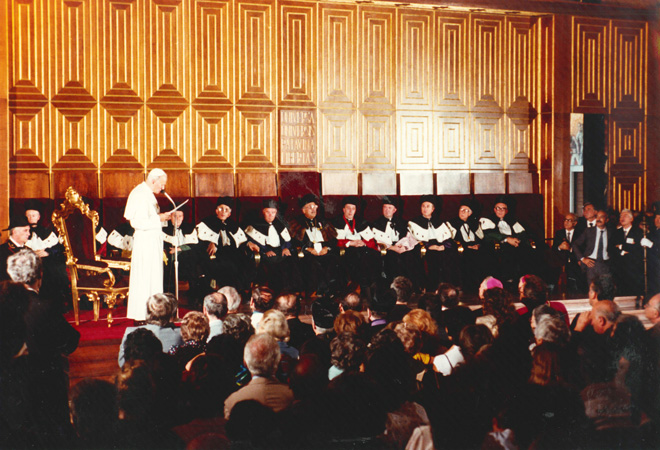Thirty years ago Pope John Paul II visited the University of Padua

(Antonio Papisca)
September the 12, is the 30th anniversary of the visit of John Paul II in the Padua University. This event deserves to be remembered due to its intrinsic uniqueness and to the content of the speech the Pope hold in the Great Hall Galileo Galilei.
The present author was among the academic Deans who were presented to the Pope by the Rector of the University, Mr. Luciano Merigliano, before he was entering the main hall. The Pope sat down in a chair, situated at the same podium, where the Rector and the Deans were sitting. I remember that, before taking the floor, Pope Wojtyla looked amazed to the countless blazons, which embellish the Great Hall and then stared at each of the Deans who he had been meeting before and who now were sitting next to him.
And there begins the speech. After having honoured the ancient Paduan University, remembering a lot of professors and students who have made it illustrious throughout the centuries, from Copernicus to Galileo, from Sant’Alberto Magno to San Gregorio Barbarigo, the Pope focuses his reflection over the two fundamental aims of the University, the science and the pedagogy, “referring also to the significant motto, which has been your ideal and program for years: ‘Universa Universis Patavina Libertas’”. This reference gives rise to the deepening of the issues of universality, liberty, truth and metaphysics, “which places the different aspects of truth and integrates them in a hierarchic way, reconstructing on the level of knowing, that deep unit of things, which is already realised on the level of being.” As to the issue of education, the Pope says that the conception “depends on the concept you have about the man and his destiny”. Starting from this assumption, he recalls his speech delivered at Unesco in 1980 in order to reaffirm that “The aim of education should always be that of helping the men becoming more mature, that is, making of him a person, who is able to fulfil completely all his possibilities and talents“.
Taking into account the great sensitivity of Pope John Paul II over the international human rights law and the commitment of the United Nations to build a more peaceful and fair international order, it comes naturally to quote article 26 of the Universal Declaration of Human Rights, which proclaims: “Everyone has the right to education… Education shall be directed to the full development of the human personality and to the strengthening of respect for human rights and fundamental freedoms. It shall promote understanding, tolerance and friendship among all nations, racial or religious groups, and shall further the activities of the United Nations for the maintenance of peace”.
Karol Wojtyla was for a long time Lecturer in the University of Cracow, with which, the University of Padua concluded a formal agreement of cooperation shortly after “The Helsinki Final Act” was signed (1975). As a Pope, he visited a lot of Universities, receiving among others the honorary degree honoris causa from University La Sapienza of Rome. The international academic world decided to return to an old custom and gave to John Paul II, the title ‘Magnus’. Evidence of this solemn recognition is the book “Giovanni Paolo II. Le vie della giustizia. Studia Joanni Paulo Magno a totius orbis iureconsultis oblata, PM an. XXV”, Libreria Editrice Vaticana, 2003, pp. 1174. It consists of hundreds of academic papars from all over the world and from Padua University as well.
Mysterium coniunctionis: on autumn of 1982, the Human Rights Centre of the University of Padua was founded. It was the first academic structure in Europe specialised on human rights and the rights of peoples.

